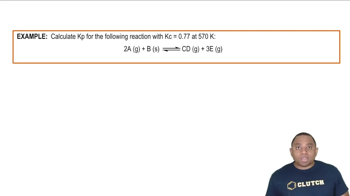Here are the essential concepts you must grasp in order to answer the question correctly.
Equilibrium Constant (Kp)
The equilibrium constant, Kp, is a numerical value that expresses the ratio of the partial pressures of the products to the reactants at equilibrium for a given reaction at a specific temperature. It is calculated using the formula Kp = (P_products) / (P_reactants), where P represents the partial pressures. A larger Kp indicates a greater concentration of products at equilibrium, while a smaller Kp suggests a higher concentration of reactants.
Recommended video:
Equilibrium Constant Expressions
Reaction Quotient (Q)
The reaction quotient, Q, is similar to the equilibrium constant but is calculated using the current concentrations or partial pressures of the reactants and products, regardless of whether the system is at equilibrium. By comparing Q to Kp, one can determine the direction in which a reaction will proceed to reach equilibrium. If Q < Kp, the reaction will shift to the right (toward products), while if Q > Kp, it will shift to the left (toward reactants).
Recommended video:
Reversing Reactions and Kp
When a chemical reaction is reversed, the equilibrium constant for the new reaction is the inverse of the original reaction's equilibrium constant. For example, if the original reaction has Kp = 7.2 * 10^7, then the equilibrium constant for the reverse reaction will be Kp' = 1 / (7.2 * 10^7). This principle is essential for calculating Kp for different reactions derived from a known reaction.
Recommended video:



